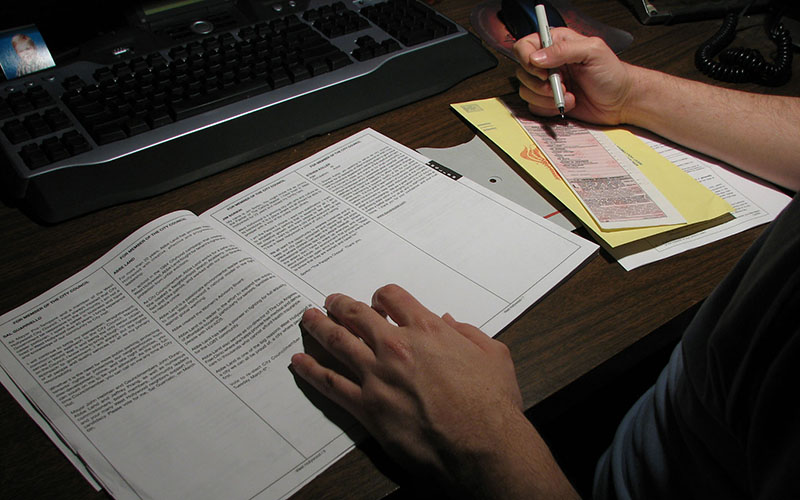
Groups challenging Arizona’s ban on ballot collecting say it will harm minority and low-income groups that rely heavily on early voting and are less likely to have access to a post office or early voting facility. (Photo by Adrian Black/Creative Commons)
WASHINGTON – The 9th U.S. Circuit Court of Appeals said Wednesday it would reconsider its decision to let stand an Arizona law that makes it a felony for third parties to collect and deliver ballots for others.
Critics say the law hurts minority and low-income voters who rely on that method of voting, which is why the court said it would again take up the “urgent case of extraordinary importance” with the election just days away.
But the calendar was also on the minds of five dissenting judges, who said the court “made a serious mistake” by agreeing to rehash the case six days before Election Day.
“There are no good reasons – and many bad ones – to take this case en banc six days before the election on such a compressed schedule,” Circuit Judge Diarmuid O’Scannlain wrote for the dissenting judges.
See related story:
Court rejects second Democratic challenge to Arizona’s voting laws
“One hopes cooler heads prevail and this case receives the attention it deserves – but I fear instead a shoot-first, ask questions later approach that will haunt us for years to come,” he wrote.
The court’s Wednesday decision is for an “en banc” review – or a review by all the judges on the circuit – of a Friday ruling by a divided three-judge panel of the court.
In that ruling, the panel said there was not enough evidence to block a law, passed by the Legislature this year, that makes it a felony for anyone other than a family member, household member, caregiver or postal worker to turn in a ballot on behalf of someone else.
The law’s supporters say it prevents large-scale ballot collection and protects the integrity of the voting process. But critics – including Democratic and minority groups that sued – say it takes away a tool that has made it easier for minority and low-income voters to cast ballots.
But the majority said there was not enough cause to block the law. Circuit Judge Sandra Ikuta wrote that the case was not “one in which ‘qualified voters might be turned away from the polls,'” but one that would merely force groups that used ballot-collection methods to find “an alternative means of mobilizing their voters.”
Chief Judge Sidney Thomas disagreed, saying in a dissent Friday that “Arizona has criminalized one of the most popular and effective methods by which minority voters cast their ballots.”
Thomas’ argument was cited Wednesday by Judge Stephen Reinhardt in an opinion supporting the en banc review.
“Despite the panel majority’s opinion to the contrary, the record in this case fully documents the disparate burden that this law imposes on minority voters,” Reinhardt wrote.
Reinhardt said the law was enacted under the “guise of guarding against voter fraud,” even though lawmakers could not identify a single case of fraud in Arizona history, which is why the panel’s decision should be reviewed.
“A decision on an issue of such profound legal and political importance that could affect not only the rights of Arizona citizens but the interests of all Americans in the outcome of a presidential election, should not depend on a 2-1 vote of three members of a panel of our court,” Reinhardt wrote.
But O’Scannlain asked, “Why the rush?” He noted that courts are reluctant to open such cases close to an election, particularly once voting has started.
“Early voting began in Arizona on Oct. 12,” he wrote. “Upsetting the applecart 90 percent of the way through voting by issuing an injunction a couple of days before Nov. 8 would fly in the face of Supreme Court guidance counseling against this exact type of last-minute interference.”
But Rep. Ann Kirkpatrick, D-Flagstaff, praised Wednesday’s announcement, saying the court should “strive to strike down barriers to voting.” Kirkpatrick, whose Senate campaign was one of the plaintiffs in the suit, said that “Arizona’s continued attacks on voting rights need to end.”
Arizona Secretary of State Michele Reagan said in an emailed statement that Friday’s ruling – along with a separate decision by the same panel upholding a state law that requires voters to cast their ballot in their assigned precincts – will improve subsequent elections.
“We’re pleased the court upheld two state laws that allow election officials to run our elections smoothly and improve ballot security,” Reagan’s statement said. “Arizonans have a right to a free and fair election and these laws go a long way to ensure election integrity.”